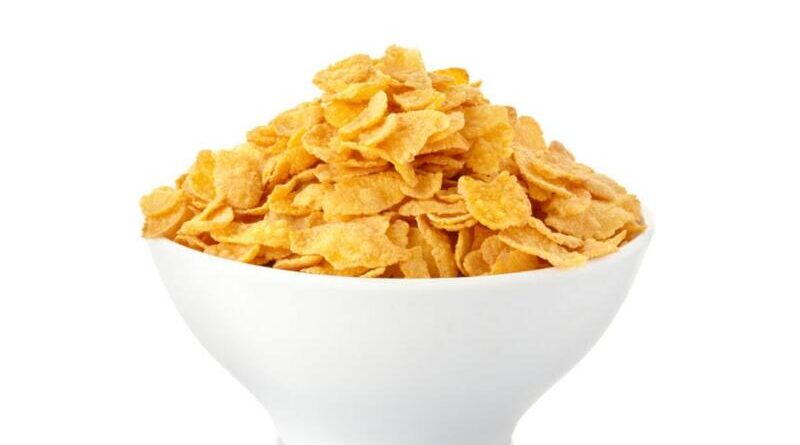Corn Flakes Nutrition: What Makes it Your Perfect Morning Fuel?
Millions of people all over the world now eat cornflakes for breakfast every day. These flakes, which are adored for their convenient size and crispy texture, are great for more than simply breakfast. In this post, we’ll examine the Corn Flakes Nutrition, including their makeup, advantages for your health, and ways to include them in your diet. Come learn the truth about the bowl and why corn flakes could become your new favorite breakfast option.
The Nutrition Facts of Corn Flakes
The main ingredient in corn flakes is cornmeal, which is then supplemented with vitamins and minerals. A normal portion has modest amounts of protein and fat in addition to carbohydrates for energy. They are also frequently enhanced with vital nutrients including iron, vitamin D, and B vitamins.
Making informed dietary decisions requires knowing how many nutrients are in corn flakes. We’ll look at the main ingredients that comprise this well-liked breakfast cereal’s nutritional profile in this section.
Important Minerals and Vitamins in Corn Flakes
To increase their nutritious content, corn flakes are fortified with a variety of vitamins and minerals. Iron helps produce red blood cells and aids in energy metabolism; vitamin D maintains bone health and immune system performance; and several B vitamins, including thiamine, riboflavin, niacin, and folic acid, are essential for energy production, neuron function, and DNA synthesis. You may choose your breakfast and your diet more wisely if you are aware of the significance of these nutrients in corn flakes.
Macronutrient Composition and Calorie Content
Because of their reputation for having few calories, corn flakes are a favorite among people trying to control their weight. A reasonable amount of carbs, mostly in the form of starch, are included in a typical serving of cornflakes, giving you the energy to go through the day.
The cereal also has a small amount of fat and protein. Both of which are necessary for muscle building and repair. You can balance your breakfast and make better nutritional decisions if you are aware of the calories and macronutrient makeup of corn flakes.
Corn Flakes’ Effect on Health
While corn flakes can be a delightful and easy addition to a balanced diet. It’s important to think about their potential health risks. Although they supply energy in the form of carbs and are frequently enhanced with vitamins and minerals, certain commercial types could also have extra sodium and sweets.
Eating corn flakes along with other nutrient-rich foods in a well-balanced diet can improve general health. However, consuming sugary or high-sodium versions in excess can have detrimental impacts on health, including weight gain and a higher chance of developing chronic illnesses like diabetes and heart disease.
As part of a healthy lifestyle, it is essential to select corn flakes carefully and consume them in proportion.
Evaluating Corn Flakes Against Other Cereals for Breakfast
Corn flakes are only one option among several when it comes to breakfast healthy cereal. Knowing how corn flakes stack up against other cereal options will help you plan your breakfast wisely.
Nutritional value, components, sodium and sugar content, fiber content, and general health impact are all important factors to take into account.
You can select the breakfast cereal that best suits your dietary requirements and health objectives by contrasting corn flakes with other options available on the market.
Taking Special Dietary Needs
Choosing the correct breakfast cereal is essential for people with unique dietary needs, such as those who are lactose or gluten-intolerant. Thankfully, a lot of corn flake manufacturers provide gluten-free varieties, so people with celiac disease or gluten sensitivity can use them.
Furthermore, some types might be supplemented with plant-based milk substitutes for people who are lactose intolerant or vegan. Recognizing your dietary limitations and looking into your options will enable you to select a corn flakes product that satisfies your requirements and yet offers the vital nutrients needed for a well-balanced meal.
Advice on Selecting and Presenting Corn Flakes
- Your morning ritual may change depending on whatever cornflakes you choose.
- To maintain the nutritional value of your meal, choose choices with less added sugar and sodium.
- For extra taste and nutrition, try mixing fresh fruit with low-fat or plant-based milk when serving cornflakes.
- To improve texture and flavor, try experimenting with different toppings, such as yogurt, almonds, or seeds.
- Furthermore, pay attention to portion sizes to prevent overindulging and preserve a balanced diet.
- You can have cornflakes as part of a filling and healthy breakfast by using these suggestions.
Conclusion
In conclusion, if chosen and prepared properly, corn flakes can be a quick and wholesome addition to your morning routine. Combining vital vitamins and minerals with minimal calories and fat, corn flakes provide an easy way to start your day right.
You can include cornflakes in a balanced diet by being aware of their nutritional profile, thinking about how they will affect your health, and looking into solutions that will satisfy your dietary requirements. To maximize their benefits, don’t forget to serve them with nutrient-rich sides and pay attention to portion amounts. Corn flakes are a tasty and satisfying breakfast option when consumed in moderation and with consideration for your health.
You Can Read More About Corn
Unlocking Corn’s Surprising Secrets: Is Corn Healthy?
Exploring the World of Healthy Popcorn Snacks
Corn Tortilla Nutrition Facts: Discover the Hidden Secrets
